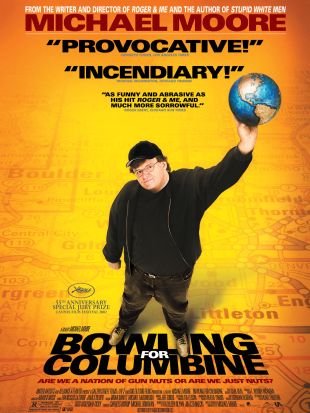
In Michael Moore's best work, the director's attitude toward his subject walks a fine line between bemusement and bitter outrage, and those two extremes are closer than one might ever expect in his film Bowling for Columbine. Moore's examination of America's three-way addiction to guns, violence, and fear doesn't offer many answers to the tough questions it poses, but to a large degree that's part of the point; one of the film's most telling moments comes when Moore interviews the father of one of the students killed in the Columbine High School massacre, and after a while he can only conclude ruefully that he simply doesn't know why America has become such a violent society. Of course, Moore certainly has his opinions about this matter, but for every moment where he's taking on K-Mart for selling handgun ammo or Charlton Heston for appearing at major pro-gun rallies days after highly publicized incidents of handgun violence (in the latter case, at least Moore's entitled as a member of the NRA), there's another where Moore sets out to find if it's true that Canadians don't lock their doors by simply barging in unannounced, or visits a bank where you can get a free rifle for opening a savings account. Moore is able to make the absurdity of real life communicate his message just as well as his rage or sadness, and the film's pointed but effective comedy not only makes the film more entertaining, but also reinforces the more somber (and sometimes shocking) material elsewhere. Bowling for Columbine has an obvious and specific political agenda (and your appreciation of the film may well have a lot to do with the degree to which you share his views), but Moore seems less interested in determining who is right or wrong than in asking what can be done to make America a safer and saner place to live, and for all the craziness (both funny and disturbing) on view, it's the shaggy regular-guy humanity of Bowling for Columbine that makes it most effective, both as a polemic and as cinema.
